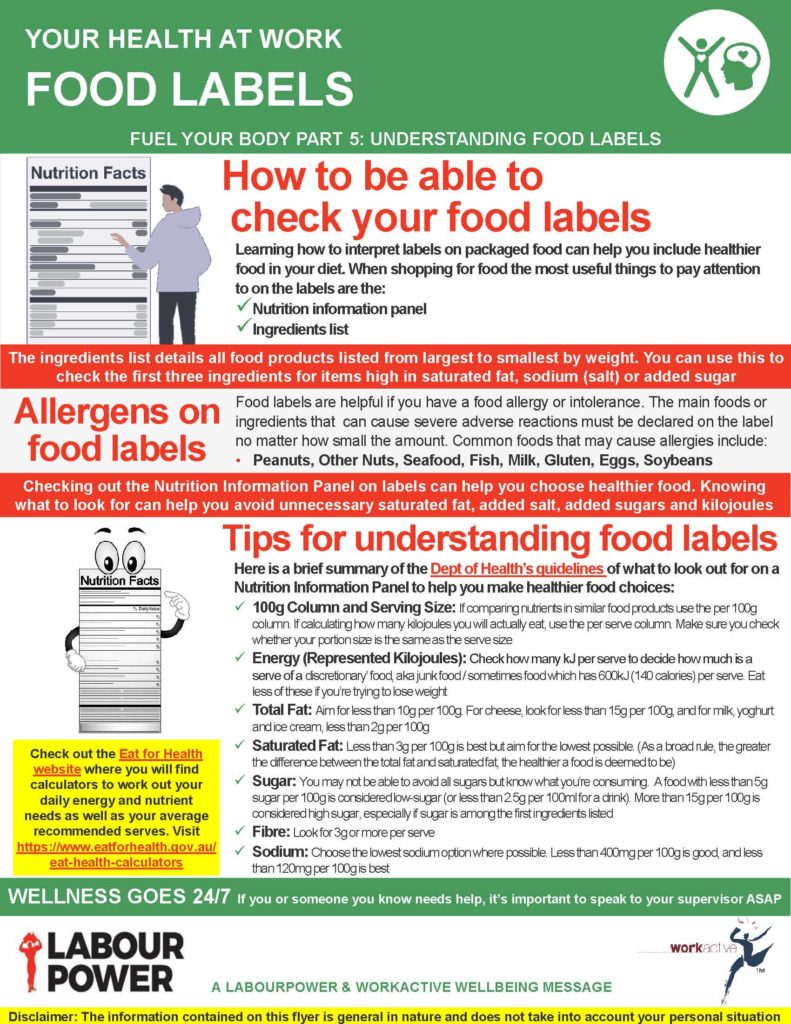Food labels contain lots of useful information that can help you make healthy choices about the food you eat.
Disclaimer: The following information is general in nature and does not take into account your personal situation
HOW TO BE ABLE TO CHECK YOUR FOOD LABELS
Learning how to interpret labels on packaged food can help you include healthier food in your diet. When shopping for food the most useful things to pay attention to on the labels are the:
- Nutrition information panel
- Ingredients list
INGREDIENTS LIST
The ingredients list details all food products listed from largest to smallest by weight. You can use this to check the first three ingredients for items high in:
- Saturated fat
- Sodium (salt), or
- Added sugar
ALLERGENS ON FOOD LABELS
Food labels are helpful if you have a food allergy or intolerance. The main foods or ingredients that can cause severe adverse reactions must be declared on the label no matter how small the amount. Common foods that may cause allergies include:
- Peanuts, Other Nuts, Seafood, Fish, Milk, Gluten, Eggs, Soybeans
NUTRITION INFORMATION PANEL
Firstly, checking out the Nutrition Information Panel on labels can help you choose healthier food. Also, knowing what to look for can help you avoid unnecessary saturated fat, added salt, added sugars and kilojoules.
TIPS FOR UNDERSTANDING FOOD LABELS
Here is a brief summary of the Dept of Health’s guidelines of what to look out for on a Nutrition Information Panel to help you make healthier food choices:
- 100g Column and Serving Size: If comparing nutrients in similar food products use the per 100g column. If calculating how many kilojoules you will actually eat, use the per serve column. Make sure you check whether your portion size is the same as the serve size
- Energy (Represented Kilojoules): Check how many kJ per serve to decide how much is a serve of a discretionary’ food, aka junk food / sometimes food which has 600kJ (140 calories) per serve. Eat less of these if you’re trying to lose weight
- Total Fat: Aim for less than 10g per 100g. For cheese, look for less than 15g per 100g, and for milk, yoghurt and ice cream, less than 2g per 100g
- Saturated Fat: Less than 3g per 100g is best but aim for the lowest possible. (As a broad rule, the greater the difference between the total fat and saturated fat, the healthier a food is deemed to be)
- Sugar: You may not be able to avoid all sugars but know what you’re consuming. A food with less than 5g sugar per 100g is considered low-sugar (or less than 2.5g per 100ml for a drink). More than 15g per 100g is considered high sugar, especially if sugar is among the first ingredients listed
- Fibre: Look for 3g or more per serve
- Sodium: Choose the lowest sodium option where possible. Less than 400mg per 100g is good, and less than 120mg per 100g is best
WHERE TO FIND MORE INFORMATION
Check out the Eat for Health website where you will find calculators to work out your daily energy and nutrient needs as well as your average recommended serves. Visit https://www.eatforhealth.gov.au/eat-health-calculators
Finally, don’t forget to check out other posts in our Fuel Your Body series for tips about healthy food choices, such as breakfast, lunch, snacks and healthy eating for shift work.
WELLNESS GOES 24/7
Labourpower values your health and wellbeing and is committed to wellness in the workplace. We are proud to partner with Workactive to bring you safety and wellbeing programs throughout the year.
We look forward to bringing you more health and wellbeing tips as part of our FUEL YOUR BODY series.
Look out for our regular Toolbox Tuesday and Wellness Wednesday posts on Facebook, LinkedIn and the Labourpower website.
